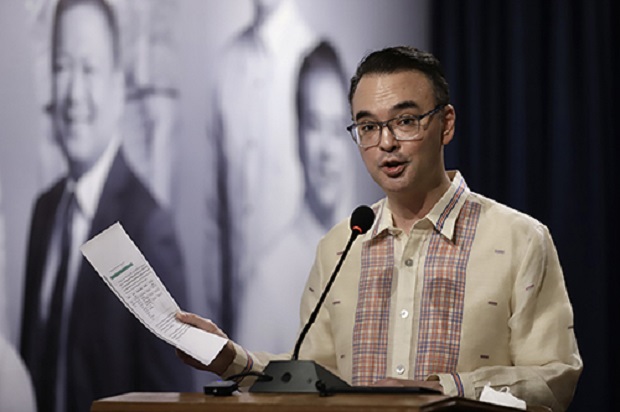Sen. Alan Peter Cayetano on Friday, Jan. 21, assured foreign chambers that the Senate is taking seriously their concern on the boosting of Internet connectivity in the country, saying the quality of digital infrastructure is the cornerstone to economic development and will consequently improve the general welfare of the Filipino people.

“We understand the importance of this bill and assure the Joint Foreign Chambers of the Philippines (JFC) and the Filipino people that the Senate is taking it seriously,” Cayetano said on January 20, 2023 in reaction to the group’s call for the Senate to take action on the proposed Open Access in Data Transmission Act upon the resumption of session next week.
The senator, who chairs the Senate Committee on Science and Technology, said the Covid-19 pandemic has shown that “we can no longer afford to be in the dark ages when it comes to the Internet and its accessibility to each and every Filipino.”
“This is why I have also personally taken it upon myself to push similar measures that will promote the availability of the Internet among our kababayans,” he said.
Aside from the foreign chambers, the advocacy group Better Broadband Alliance (BBA) also called on Congress last year to pass the Open Access in Data Transmission and Faster Internet Services bills to address poor Internet access, especially in the rural areas.
Citing data from various sources, BBA claimed that Covid-19 and the lockdown restrictions have forced many sectors to deliver services online and revealed the poor state of Internet access. Millions of Filipinos are still unable to access the Internet, including 55% of adult Filipinos, 82% of households, and 83% of all enrolled students in public schools.
The Social Weather Stations latest survey revealed that 55% of adult Filipinos still do not use the Internet. While 65% of residents in the National Capital Region access the Internet, only 39% and 32% do so in the Visayas and Mindanao, as of December 2019.
In 2018, the Department of Information and Communications Technology (DICT) commissioned the country’s first National ICT Household Survey (NICTHS), which revealed that only about 17.7% of households have their own Internet access at home.
For communities, 63.7% of barangays have no access to cellular towers; 70.2% have no access to fiber optic cables; and 87.8% have no access to free public Wi-Fi service.
The problem is much worse in BARMM (Bangsamoro Autonomous Region in Muslim Mindanao), MIMAROPA (Mindoro, Marinduque, Romblon and Palawan), Cagayan Valley, Central Visayas, and the Bicol regions, with less than 20% of barangays having access to broadband infrastructure.
In the education sector, the pandemic brought to light the persistent issues of expensive, slow, and unreliable Internet access, which the National Economic Development Authority (NEDA) identified as major risks in education preventing the sector from fully taking advantage of online education platforms.
Back in May 2020, the Department of Education (DepEd) estimated that 52% of all public schools did not have access to Internet facilities. In December, DepEd’s learner’s survey revealed that only 3.6 million of the 21.8 million enrollees this year had Internet access.
This means that about 83% of students in public schools nationwide are unable to go online. The lack of Internet access and high cost of broadband services have forced the DepEd to resort to using printed modules, TV, and radio broadcast.
Poor connectivity also affects financial inclusion. The Bangko Sentral ng Pilipinas’ financial inclusion survey showed that only 29% of adult Filipinos are banked, leaving 51.2 million still unbanked. The BSP is pushing for digital banking and electronic money but see Internet connectivity as a huge challenge, especially in the countryside.
To address these concerns, BBA said it is calling for the passage of the Open Access in Data Transmission and the Faster Internet Service bills.
“It is urgent to pass these two legislative proposals to improve digital connectivity as an essential survival tool during the pandemic and to empower Filipinos to meaningfully participate in the digital economy, beyond this crisis. BBA urges Congress to act on these bills immediately to help the country build back better and move forward, digitally,” the group said in a statement.
The Open Access in Data Transmission bill:
- Lowers barriers to entry and introduces a simple licensing process for broadband network providers,
- Fast-tracks network deployment through infrastructure sharing and coordinated rollout with other sectors, such as roads and electricity, and
- Makes spectrum management more efficient and transparent.
On the other hand, the Faster Internet Service bill requires that service providers consistently deliver the broadband speeds that they advertise and ensures that consumers get what they pay for.




